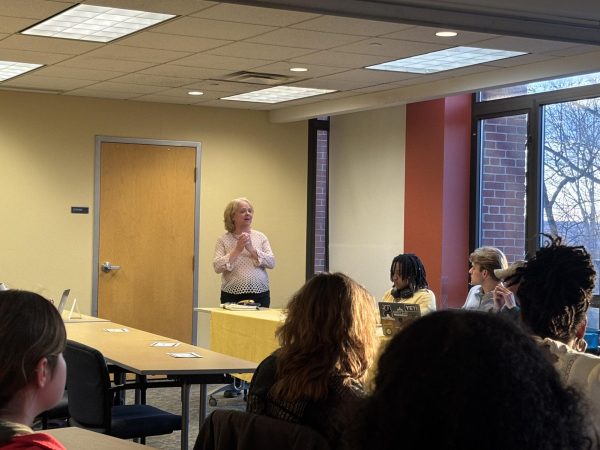‘Day Without Women’ draws attention to inequality
Some Allegheny women wore red and chose to abstain from classes and meetings on Wednesday, March 8, in a protest inspired by International Women’s Day.
The United Nations’ website states that the purpose of the day was to educate the public on women’s issues and empower women to strive for workplace equality. The UN is the organization that designated March 8 to be International Women’s Day.
“Around the world, tradition, cultural values and religion are being misused to curtail women’s rights, to entrench sexism and defend misogynistic practices,” said António Guterres, the U.N.’s secretary-general in a U.N. press briefing on March 8.
In support of the International Women’s Day, an email was sent out to the student body by Sarah Nathan, ’19, urging participation in the protest she helped organize.
“Don’t go to class, don’t go to work, don’t spend any money,” the email read in part.
The day-long protest was organized and hosted by a new group on campus known as #WeStandWith. Rather than being an ASG-recognized group with elected leadership, the group has taken a less regulated approach to organizing and protesting.
“I would say that it’s more of a flat management structure,” said Luka Crozier, ’19, a member of #WeStandWith.
The movement was conceived in the aftermath of the 2016 presidential election as a response to the current state of politics in the U.S., according to Crozier.
“There’s, I think, a great deal of concern that’s pretty nationwide. #WeStandWith is an organization to express that concern, specifically regarding the Allegheny campus,” Crozier said.
On Jan. 26, 60 protesters assembled and marched from the Henderson Campus Center to Brooks Circle, advocating for several causes, one of which was women’s rights.
“The moment that I think of as very formative for #WeStandWith was the meeting before the first protest. A lot of people came together and there were so many ideas,” Crozier said.
Professor of Modern and Classical Languages Julia Ludewig, who wore red on Wednesday, also attended that meeting.
“Coming back from the March on Washington, we needed to figure out a way to channel that energy we felt,” Ludewig said.
With those ideas and energy in mind, #WeStandWith saw the International Women’s Day as a perfect opportunity to assemble and advocate not just for women, but all groups, according to Nathan.
“Part of the reason we wanted to do this through #WeStandWith is because it is really about a lot of marginalized and oppressed groups,” Nathan said. “#WeStandWith really highlights that intersectionality and the importance of understanding the relative privilege of some women over others and the need to just really support other groups in this event.”
Although International Women’s Day was being celebrated in almost 30 countries, according to Nathan, protesting and abstaining from work was something unique to Allegheny.
“We wanted to make it a more formal event at Allegheny because without creating an event on Facebook or putting it on an email, we were worried that people wouldn’t participate in the strike,” Nathan said.
Samantha Haran, ’20, wore red on Wednesday in support of the protest but chose to attend all her classes.
“I think it is definitely a really good cause and a really good movement,” Haran said. “It’s really important to band together and protest.”
In addition to avoiding class and work, #WeStandWith also organized an outdoor protest at Brooks Circle, but the event was canceled due to high winds.
On March 8, The Economist published its fifth annual glass-ceiling index, which ranked countries by the prosperity of their women. The United States ranked 20th in front of countries such as Great Britain and Switzerland, but behind nations like Germany and France. The data used to create the rankings pertained to equal pay, percentage of women who attend institutions of higher education, and women’s participation in the work force.
Nathan said International Women’s Day and the #WeStandWith protest was not just about workplace equality.
“A lot of the work women do goes unnoticed and unappreciated, especially unpaid work,” Nathan said. “In terms of running meetings or childcare or doing housework, these are all things that can be overlooked, so by removing women from society for a day, essentially, the hope is to shed light on the important role that women are playing.”
#WeStandWith has collaborated with several groups on campus in the past, most notably the Andrew Goodman Foundation, according to Crozier. On Feb. 7, the organizations hosted a phone bank where students could call their government representatives and speak about issues they cared about.
Moving forward, #WeStandWith hopes to continue to do activism on campus and in the Meadville community. Ludewig said they are planning an event in April that will bring together students and community members to address the question of how we move forward with sustaining political action.
“This is about anyone who wants to rally around common political goals,” Ludewig said.
Ludewig said she wants to try and bring together the many different groups on campus who are working independently on similar issues. Crozier said this is a goal she shares.
“I think most people want a fair wage and want opportunities to succeed,” Crozier said.
Ludewig said these efforts are “still a work in progress.”









